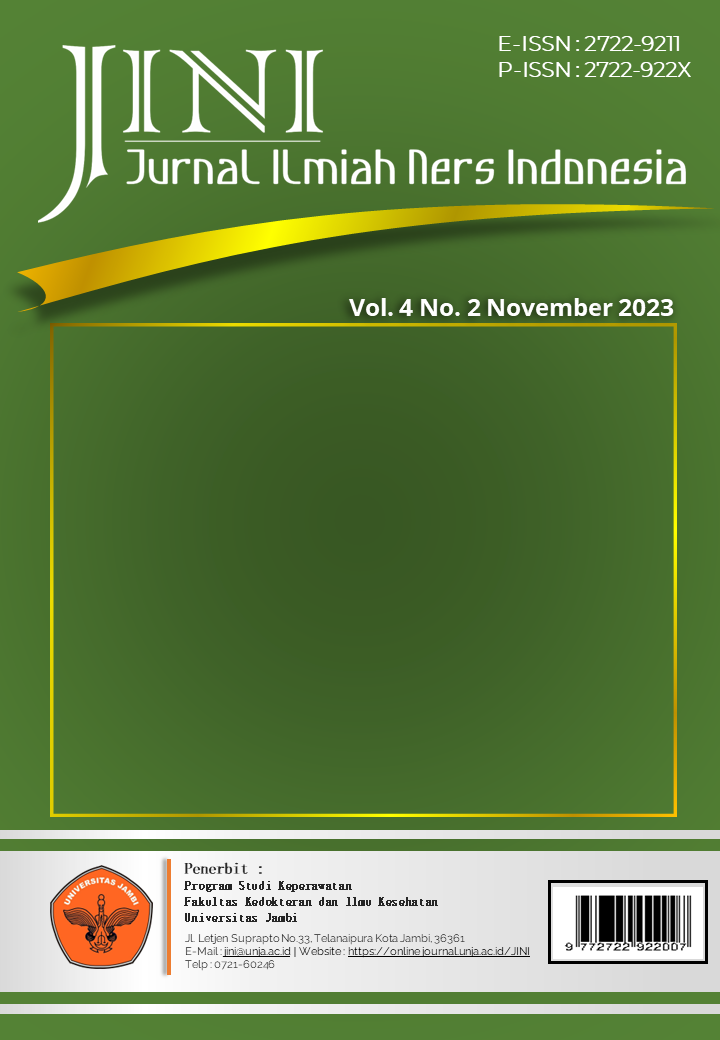Pengaruh Pendidikan Kesehatan ASI Eksklusif terhadap Breastfeeding Self-Efficacy pada Ibu Menyusui
DOI:
https://doi.org/10.22437/jini.v4i2.27673Keywords:
Breastfeeding Self-Efficacy, Healt Education on Exclusive BreastfeedingAbstract
Breast milk (ASI) is the optimal nutrition for infants compared to formula milk. One key factor in the success of exclusive breastfeeding is Breastfeeding Self-Efficacy (BSE), which can be enhanced through health education. This study aims to determine the impact of health education on exclusive breastfeeding on breastfeeding self-efficacy. The research employed a quasi-experimental design with a nonequivalent (pretest and posttest) control group approach. The sample comprised breastfeeding mothers with infants aged 0 to 2 years, totaling 34 respondents divided into intervention and control groups. Purposive sampling was utilized for sample selection. The instrument employed was the Breastfeeding Self-Efficacy Scale Short Form (BSES-SF). Bivariate analysis was conducted using an independent t-test to examine whether there were differences in breastfeeding self-efficacy between the intervention and control groups. Results showed a significant p-value (0.000) < α (0.05), indicating an influence of exclusive breastfeeding health education on breastfeeding self-efficacy among breastfeeding mothers.
Abstrak
Air Susu Ibu (ASI) merupakan nutrisi terbaik bagi bayi dibandingkan dengan susu formula. Salah satu faktor keberhasilan pemberian ASI eksklusif adalah Breastfeeding Self- Efficacy (BSE). BSE bisa ditingkatkan dengan pemberian pendidikan kesehatan. Penelitian ini bertujuan untuk mengetahui pengaruh pemberian pendidikan kesehatan tentang ASI eksklusif terhadap breastfeeding self-efficacy. Metode penelitian menggunakan  quasy experimental dengan pendekatan nonequivalent (pretest and posttest) with control group design. Sampel dalam penelitian ini adalah ibu menyusui bayi berusia dari 0 bulan sampai dengan 2 tahun yaitu sebanyak 34 responden yang terbagi atas kelompok intervensi & kelompok kontrol. Teknik pengambilan sampel pada penelitian ini menggunakan purposive sampling. Instrument yang digunakan adalah kuesioner breastfeeding self-efficacy scale short form (BSES-SF). Analisa bivariat menggunakan uji independent t test. Berdasarkan hasil penelitian didapatkan nilai signifikasi p value (0,000) < α (0,05) yang berarti ada pengaruh pemberian pendidikan kesehatan tentang ASI eksklusif terhadap breastfeeding self-efficacy pada ibu menyusui.
Â
Downloads
References
Angio, M. (2018). Pengaruh Peer Education terhadap Self Efficacy dan Motivasi pada IBu Menyusui dalam Pemberian ASI. Jurnal Ilmu Keperawatan Komunitas, 2(1).
Chifdillah, N. (2021). Perbedaan Pengaruh Pendidikan Kesehatan dengan Media Audiovisual dan Media Visual terhadap Pengetahuan Mahasiswa tentang COVID-19. Mahakam Midwifery Journal, 6(1).
Chipojola R., et al. (2019). Effectiveness of theorybased educational interventions on breastfeeding self-efficacy and exclusive breastfeeding: a systematic review and meta-analysis. International Journal of Nursing Studies. https://doi.org/https://doi.org/10.1016/j.ijnurstu.2020.103675.
Dennis, C.-L. & Faux, S. (1999). Development and psychometric testing of the Breastfeeding Self-Efficacy Scale. Research in Nursing and Health, 22(5).
Dennis, C.-L. (2003). The Breastfeeding Self-Efficacy Scale: Psychometric Assessment of the Short Form. JOGNN, 32. https://doi.org/10.1177/0884217503258459
Departemen Kesehatan RI. (2005). Kebijakan Nasional Promosi Kesehatan. Jakarta: Pusat Promosi Kesehatan Kementerian Kesehatan RI.
Diki Retno Yuliani. (2022). Media Edukasi Video Untuk Meningkatkan Breastfeeding Self-Efficacy (Efikasi Diri Menyusui). Jurnal Sains Kebidanan, 4(2).
Dinas Kesehatan Kabupaten Kendal. (2022). Profil Kesehatan Kabupaten Kendal Tahun 2021.
Ehlayel, M. S., Bener, A., & Abdulrahman, H. M. (2009). Protective effect of breastfeeding on diarrhea among children in a rapidly growing newly developed society. The Turkish Journal of Pediatrics, 51(6), 527-33. Retrieved from http://search.proquest.com/.
Endah Wahyutri dkk. (2020). Menurunkan Resiko Prevalensi Diare dan Meningkatkan Nilai Ekonomi Melalui ASI Eksklusif. Scopindo Media Pustaka.
Isyti'aroh dan Rofiqoh Siti. (2017). Breatfeeding Self Efficacy dan Hubungannya dengan Perilaku Ibu Menyusui. Jurnal Kesehatan Pena Medika. 7 (2). http://jurnal.unikal.ac.id/index.php/medika ISSN : 2086-843X.
Kåre Letrud. (2018). Excavating The Origins of The Learning Pyramid Myths. Cogent Education, 5(1).
Kementrian Kesehatan Republik Indonesia. (2022). Profil Kesehatan Indonesia Tahun 2021.
Lee Y.-H., et al. (2019). Effects of Education and Support Groups Organized by IBCLCs in Early Postpartum on Breastfeeding. Midwifery. https://doi.org/https://doi.org/10.1016/j.midw.2019.03.023
Mccarter-Spaulding, D. & Gore, R. (2009). Breastfeeding self-efficacy in women of African descent. Journal Obstetric Gynecology Neonatal Nursing, 38, 230-43.
Notoatmodjo. (2012). Promosi Kesehatan dan Perilaku Kesehatan. Rineka Cipta.
Perry, S.E., Hockenberry, M.J., Loedermilk, D.L., Wilson, D. & Wong, D.L. (2010). Maternal child nursing care. Missouri: Mosby Elsevier.
Riordan, J.,Wambach, K. (2016). Breastfeeding and Human Lactation. Jones and Barlett Publishers.
Riyanti Eka, Nurlaila, dan Diah Astutiningrum. (2018). Pengaruh Edukasi Breastfeeding Ibu Postpartum Terhadap Breasfeeding Self Efficacy. Jurnal Ilmiah Kesehatan Keperawatan.14 (3). http://ejournal.stikesmuhgombong.ac.id/index.php/JIKK/index.
Sardiman, A. . (2014). Media Pendidikan: Pengertian, Pengembangan dan Pemanfaatannya. Raja Grafindo Persada.
Sari Dewi, A. P., M. S., & R. W. (2021). Pendidikan Kesehatan Tentang Teknik Menyusui Dengan Metode Peragaan Dan Video. Indonesia Jurnal Kebidanan, 5.
Siti RF, dan L. N. (2019). Dampak dari Tidak Menyusui di Indonesia pada Pekan ASI IDAI 2016. Idai.or.Id. https://www.idai.or.id/artikel/klinik/asi/dampak-dari-tidak-menyusui-di-indonesia
Sugiyono. (2016). Metode Penelitian Kuantitatif kualitatif dan R&D. Alfabeta.
Titaley C. R., et al. (2021). Determinants of low breastfeeding selfefficacy amongst mothers of children aged less than six months: results from the BADUTA study in East Java, Indonesia. International Breastfeeding Journal. https://doi.org/https://doi.org/10.1186/s13006-021-00357-5.
Tseng J-F., et al. (2020). Effectiveness of an integrated breastfeeding education program to improve self-efficacy and exclusive breastfeeding rate: A single-blind, randomised controlled study. International Journal of Nursing Studies.
Walyani, E. & P. (2017). Asuhan Kebidanan Masa Nifas Dan Menyusui. Pustaka Baru Press.
Wulandari, P., & Susilawati, S. (2021). Studi literatur: faktor-faktor yang mempengaruhi breastfeeding self efficacy. Malang Journal of Midwifery, 3(2).
WHO. (2015). Angka Kematian Bayi Pada Negara ASEAN 2015.
Downloads
Published
How to Cite
Issue
Section
License
Copyright (c) 2023 Jurnal Ilmiah Ners Indonesia

This work is licensed under a Creative Commons Attribution-NonCommercial-ShareAlike 4.0 International License.
Jurnal Ilmiah Ners Indonesia (JINI) memberikan akses terbuka terhadap siapapun agar informasi dan temuan pada artikel tersebut bermanfaat bagi semua orang. Semua konten artikel Jurnal ini dapat diakses dan diunduh secara gratis, tanpa dipungut biaya, sesuai dengan lisensi creative commons yang digunakan.

Ciptaan disebarluaskan di bawah Lisensi Creative Commons Atribusi-BerbagiSerupa 4.0 Internasional.



